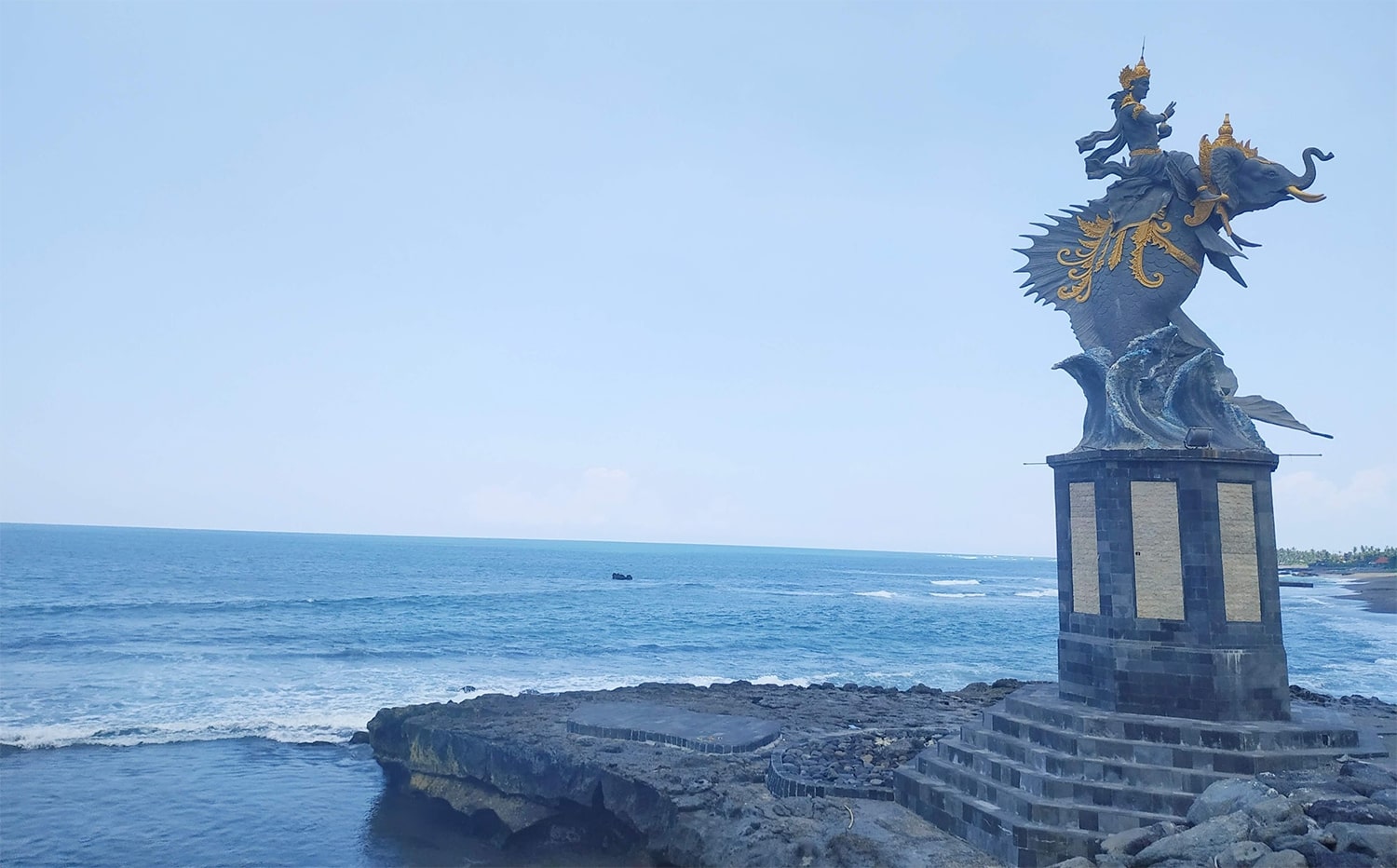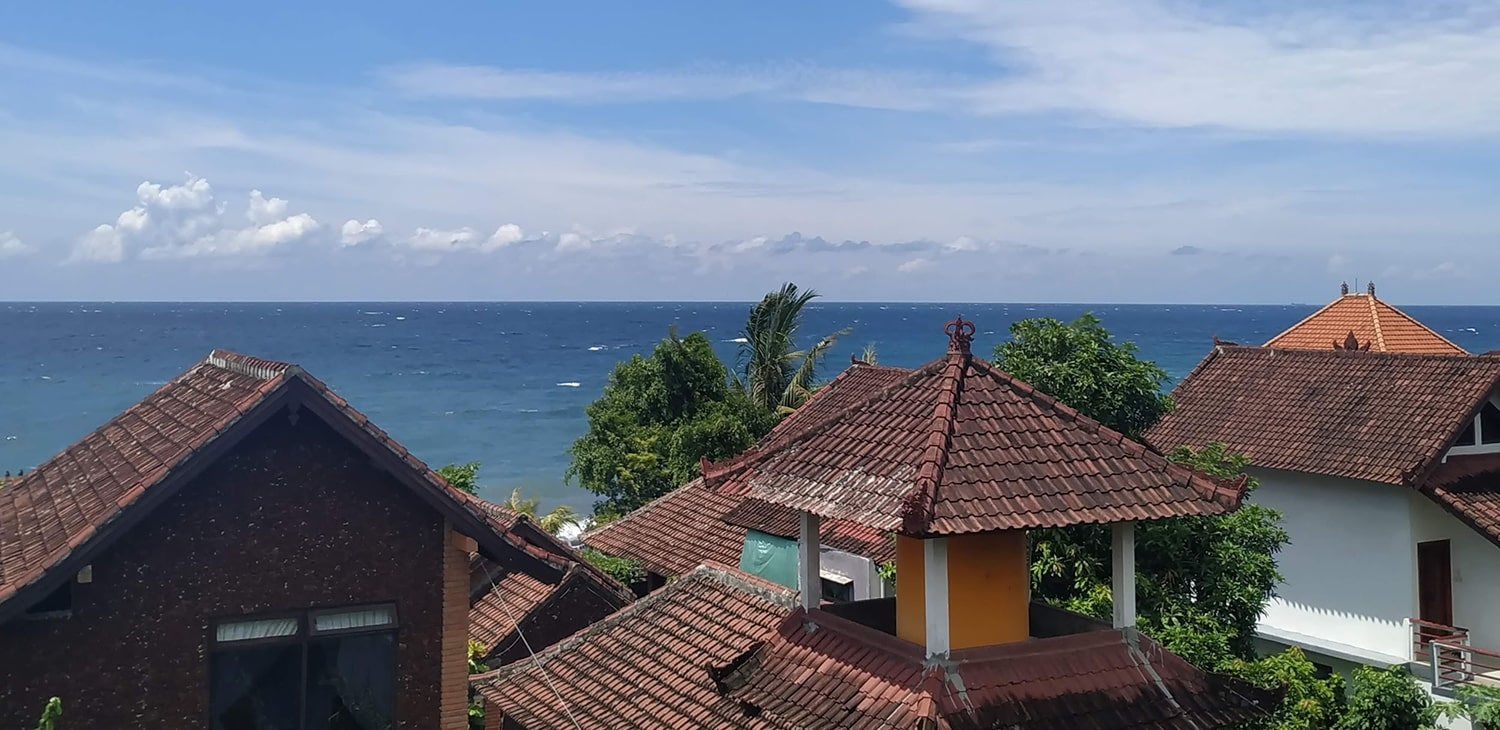A Telecommuter's Guide to the Galaxy: Bali
Even if you can’t place it on a map, the island of Bali likely conjures dreamy images of paradise. Tucked away amongst over 17,000 other islands that make up the Indonesian archipelago, Bali’s Hindu culture and varied landscapes culminate in a truly unique flavor. From the majestic mountains of Agung and Batur, to the exquisite temples of Uluwatu and Tanah Lot, to the complex sunsets and exotic beaches, most of Bali’s 6.5 million annual tourists come for a mix of adventure, nature, and relaxation.
In recent years, Bali has drawn in a new type of visitor: the telecommuter. They’re lured for all the same reasons as your average tourist, but emboldened by the promise of a low cost of living, an amenable visa regime, a year-round tropical climate, and a burgeoning digital infrastructure. And they’re coming in droves. Bali may well be the world capital for telecommuters now. It’s easy to understand why: when you can do your job from anywhere, why not pick an island paradise?
No place on Earth is truly paradise, but some parts of Bali do get transcendentally close. Other parts, however, can resemble precisely the opposite. Decades of tourism have had an enormous impact on the small island of Bali. The roads simply can’t keep up with the rapid pace of development. You can spend hours in aching traffic jams along potholed one-lane roads through places that once saw a good amount of tourism but now have shuttered into quasi ghost towns because the hype has moved elsewhere.
While the average tourist can get shuttled along by guidebooks and tour groups, making it up as they go, the telecommuter has to take their time in Bali more seriously: this is work, not a vacation. Well, it’s both. But with a bit of planning, you can truly make the most of your time on the island. And with a minimum amount of conscious effort—buying locally-produced products, frequenting environmentally-friendly establishments, and investing in families instead of corporations—you can make Bali a slightly more sustainable place, too.
In addition to some general tips for telecommuting from Bali, below you’ll find three safe harbors for work (and one vacation spot) that allow you to do your job and also easily branch out further to other areas as you see fit. Just don’t wait too long—the wave of tourist hype could soon swallow these regions up in a mess of garish development. But if that does happen, just go a little further down the road. Paradise, or something close to it, is never that far away when you’re in Bali. When work is over, there’s plenty to explore.
Practicalities of Getting Set Up in Bali
Packing
Even though you’re technically relocating for a significant period of time, don’t bring a lot of stuff. You won’t need it, and you’ll curse yourself for carrying it on your back through humid 90 degree weather. The less you bring, the more you can buy and Bali has just about everything you could need—and usually at a cheaper price than what’s available back home.
What you won’t be able to find easily are the tools to do your job: laptop, noise-cancelling headphones, a power bank, and an unlocked smartphone. So, other than that, leave plenty of space in your backpack. You’ll want to buy things as you go.
From a safety point of view, it’s best practice to bring more than one debit/credit card, and keep them in separate places. Losing your only card or having it skimmed by a compromised ATM, is a major headache. So have a backup, and better yet, have a backup for your backup. Your bank will likely refund your fraudulent charges, but getting a new debit card delivered to Bali is not a simple operation.
Visa Rules
Try to get some rest on your 10+ hour flight to Ngurah Rai International Airport, because long immigration lines and somewhat misleading signs will be waiting for you upon landing.
Over 160 nationalities do not need a visa in order to enter Bali. This visa-free entry is valid for 30 days in Indonesia, including the day of your arrival. This visa-free entry does not cost anything, and it cannot be extended, but it can be reset by leaving Indonesia to, say, Kuala Lumpur or Singapore, both of which are serviced with cheap direct flights.
A second option for longer-term telecommuters is to decipher the somewhat misleading signs and get a visa on arrival, which is also valid for 30 days, but costs $35 and is capable of being extended once for an additional 30 days. The extension will most likely require you to hire a local service in order to help, as well as pay an additional fee which, at the time of writing, was less, on average, than a return flight to Kuala Lumpur or Singapore from Bali.
Neither option can be renewed or reset indefinitely. More expensive and more confusing options exist for those who wish to stay in Bali—and only in Bali—for longer than 30 days. But taking the visa-free entry gives you the most flexibility, and gives you some time to decide whether Bali is right for you. In the end, your best bet is probably to just follow the hordes of people towards the main immigration queues to get your passport stamped for free, then enjoy the next 30 days.
Housing
The most important decision you’ll make while you’re in Bali is where to stay (see the locations listed further down to get some inspiration).
No matter which area you choose, you’ll be presented with an overwhelming number of options for housing. There’s something for every budget. While many places offer discounts for longer stays, you don’t need more than your first week of accommodation booked in advance, as you’ll most likely want to move around. You just need that first week to scout your options and get the lay of the land.
Try to book a family-run guesthouse. If you do, you’ll be able to arrange a fairly-priced transfer from the airport in advance, thus avoiding the chaos that waits for people on the other side of Ngurah Rai’s immigration queues.
And that initial contact with a family-run guesthouse can be one you treasure throughout your stay in Bali. In addition to providing guests with a personal introduction to the island’s culture, family-run businesses on Bali tend to cooperate with each other, meaning that even if you move across the island, your original host can come in handy when arranging logistics like taxis, boats, luggage storage, and future housing. Dealing with a larger business, you can’t really be sure who you’re talking to—but you can trust a Balinese family.
Safety
Crime isn’t much of a problem in the more pleasant parts of Bali. By far the biggest danger you’ll face will come with wheels attached. Scooters are a popular way to get around in Bali, but they’re also a leading cause of tourist injury. Road congestion mixed with impatient drivers and a lack of sidewalks is a recipe for trouble. Unless you have some experience on a motorbike, consider getting yourself some lessons in a less chaotic area first.
Off the roads, the only problem you’re likely to encounter is getting slightly ripped off. It’s rare, but it happens. Severe economic disparity between the inhabitants of Bali and the foreigners who frequent the island creates some nasty incentives. The people of Bali are immensely conscious of their karma and respect is almost always met with respect, but a few bad apples may still cross your path. In practice, the amount of money you’re likely to lose on an unscrupulous transaction is relatively low. If it happens, try to shrug it off, and consider it a tourist tax.
Four Spots for Telecommuters in Bali
Surf and Shop in Canggu
Canggu marks the westernmost reach of the tourist wave in South Bali. While it’s seen rapid development over the last few years, the area has managed to maintain a careful balance between convenience and soul. It’s the ‘least Bali’ of all the locations on this list, and also the most expensive of the bunch, but if you want a work-and-beach lifestyle—the kind with avocado toast for breakfast and tuna tartar for dinner—this is where you want to go.
There are no buildings more than two stories high and the laid-back vibe is a mix between surfer and hipster. Massive waves pound Echo Beach from dawn until sunset and make for excellent viewing from the small cafes and restaurants that line the shore’s modest cliffs.

Infrastructure hasn’t quite caught up to Canggu yet. The roads leading in are in a woeful state. And the internet speeds are, on average, abysmal. If you’re working in a data-intense role, or if you need stable video calls, you will need to invest in either a tether-capable SIM card (Telkomsel is the most stable provider, but results will vary) or a dedicated coworking space (like The Dojo).
But if you’re a little less dependent upon stable, high-speed internet, several cafes in the area (such as Alter Ego) can handle a moderate workload. If you prioritize a good view and cheap prices over connectivity, head down to Echo Beach, where modest cafes and food shacks line the sand.
Outside of work, you might not feel too far from home in a place like Canggu. Hip boutiques peddle hand-stitched dresses and custom surfboards. The beach draws in surfers, swimmers, and onlookers alike. And in the evening, practically everyone gathers on the sand for the reliably epic sunsets off the coast. Daily life isn’t too different than it is in, say, Venice Beach. While you won’t find much tranquility in Canggu, you will get a proper introduction to the lifestyle that put Bali on many foreigners’ maps.
Canggu also makes a good launch point to Tanah Lot and the less-trafficked West. A week in Canggu is often enough to get your bearings and decide what you want to do next.
Network and Learn in Ubud
If Canggu strikes you as a little too commercialized, head to the center of the island, to Bali’s spiritual capital: Ubud. While an influx of tourism over recent years has made Ubud a little bit more of a spirituality gift shop than a center of spiritualism itself, a short walk out of the city center will get you closer to some authenticity.
Opportunities for yoga classes and retreats are ubiquitous (check out The Yoga Barn), but the telecommuting community isn’t far behind. Co-working spaces like Hubud and the Outpost blend styles with the Ubud ethos of self-improvement through seminars, workshops, and meditation classes.

Ubud is a city where the party doesn’t go late—if there is any party at all—but, surprisingly, it’s an easy city to connect in. As a telecommuting hub, it’s not uncommon to find several people sitting and typing on their laptops in a cafe, restaurant, or bar. Co-working spaces, which sometimes double as co-living spaces, host a variety of networking events. And, maybe it’s just something in the Ubud air, but both the average tourist and the average local are more inclined to have a meaningful conversation with a random fellow citizen of the world. This is a place where one can learn about Balinese Hinduism (which dates back to 100 BC) or just have a drifting talk about the meaning of life with a total stranger.
For a telecommuter, the city is quite self-contained, with everything one might need. Internet speeds are significantly faster than they are in Canggu; the prices are noticeably lower; and the quiet vibe of Ubud lends itself to a hum of rhythmic productivity.
Should one feel adventurous, Ubud is a launching point for some of the more exotic excursions on the island: into the rice fields, up Mount Batur, through the Monkey Forest, into the Water Palace, and onto jungle treks that go further afield. The Ubud city center may not have the immediate Instagram-ability of Canggu, but it might get you to stay longer and be more productive than you intended.
Focus and Relax in Amed
Located on the Eastern tip of Bali, Amed is a point of welcome respite from the more urban hubs of the island. Outside of free-diving, snorkeling, and scuba diving (there’s a sunken Japanese submarine from WWII that rests off the coast), this is a town with very little in the way of adrenaline.
Even the roads, which are unpaved, encourage a sedate and unhurried state of mind: in Amed, a beginner might even feel comfortable learning to ride a motorbike. There is no city center to speak of, just small and scattered guesthouses, nicely spaced apart and most with outstanding views.
Perhaps the biggest surprise about Amed is the internet speeds. For example, The Cup Resto (a cafe attached to the family-run Sola Luna Guesthouse) has free Wi-Fi that’s consistently over 30 mbps, and the view from the roof is killer. You’ll likely be the only one using it, too.

Amed isn’t a place you go to in order to do a lot of crazy stuff. It’s a place you come to sit in the sun, splash in the water, and get some work done. Spend more than a couple weeks in Amed, though, and you’re liable to go a little crazy. Aside from the usual nightly thunderstorm (they are epic), it’s just that quiet. But for as long as you can enjoy it, it’s likely to be the most productive period you’ll have in Bali and also one of the most restorative.
If you get itchy feet, Amed is a fine spot to zip along the largely unknown northern coastline. And if you’d rather take a true vacation, Amed does has its own port, which services the Gili Islands.
Go Off the Grid in the Gili Islands
When working in a tourist playground such as Bali, you’d be forgiven for once in a while wanting to throw your laptop into the ocean and join the hordes. So if you need a vacation from your vacation, the Gili Islands are there for you.
Located just an hour away by boat from Bali, these three small specks of sand are not suitable for remote work: the power can go out at any time and the internet is painfully slow even on the best of days. But for an overworked telecommuter, they provide a perfect respite. Motorized transport is banned. Bicycles and horses are the main modes of conveyance. The largest of the three islands can be circumnavigated on foot in just over an hour. The beaches are quiet, and truly idyllic.

The Gili Islands are, by most Western standards, one of the more remote places on Earth: multiple flights, a couple of long taxis, a boat and several time zones away. But for a telecommuter working in Bali, they’re just next door.
World-class snorkeling and scuba diving await, with rich biodiversity and ancient cultural emblems below the water’s surface. Back on land, hammocks and fresh coconuts abound. After a month or two of hard work, a week in the Gilis will have you sitting and smirking to yourself, thinking about how outrageously lucky you are to be there.


